Abstract
Two lactose-fermenting Salmonella typhi strains were isolated from bile and blood specimens of a typhoid fever patient who underwent a cholecystectomy due to cholelithiasis. One lactose-fermenting S. typhi strain was also isolated from a pus specimen which was obtained at the tip of the T-shaped tube withdrawn from the operative wound of the common bile duct of the patient. These three lactose-fermenting isolates: GIFU 11924 from bile, GIFU 11926 from pus, and GIFU 11927 from blood, were phenotypically identical to the type strain (GIFU 11801 = ATCC 19430 = NCTC 8385) of S. typhi, except that the three strains fermented lactose and failed to blacken the butt of Kligler iron agar or triple sugar iron agar medium. All three lactose-fermenting strains were resistant to chloramphenicol, ampicillin, sulfomethoxazole, trimethoprim, gentamicin, cephaloridine, and four other antimicrobial agents. The type strain was uniformly susceptible to these 10 drugs. The strain GIFU 11925, a lactose-negative dissociant from strain GIFU 11926, was also susceptible to these drugs, with the sole exception of chloramphenicol (minimal inhibitory concentration, 100 micrograms/ml).
Full text
PDF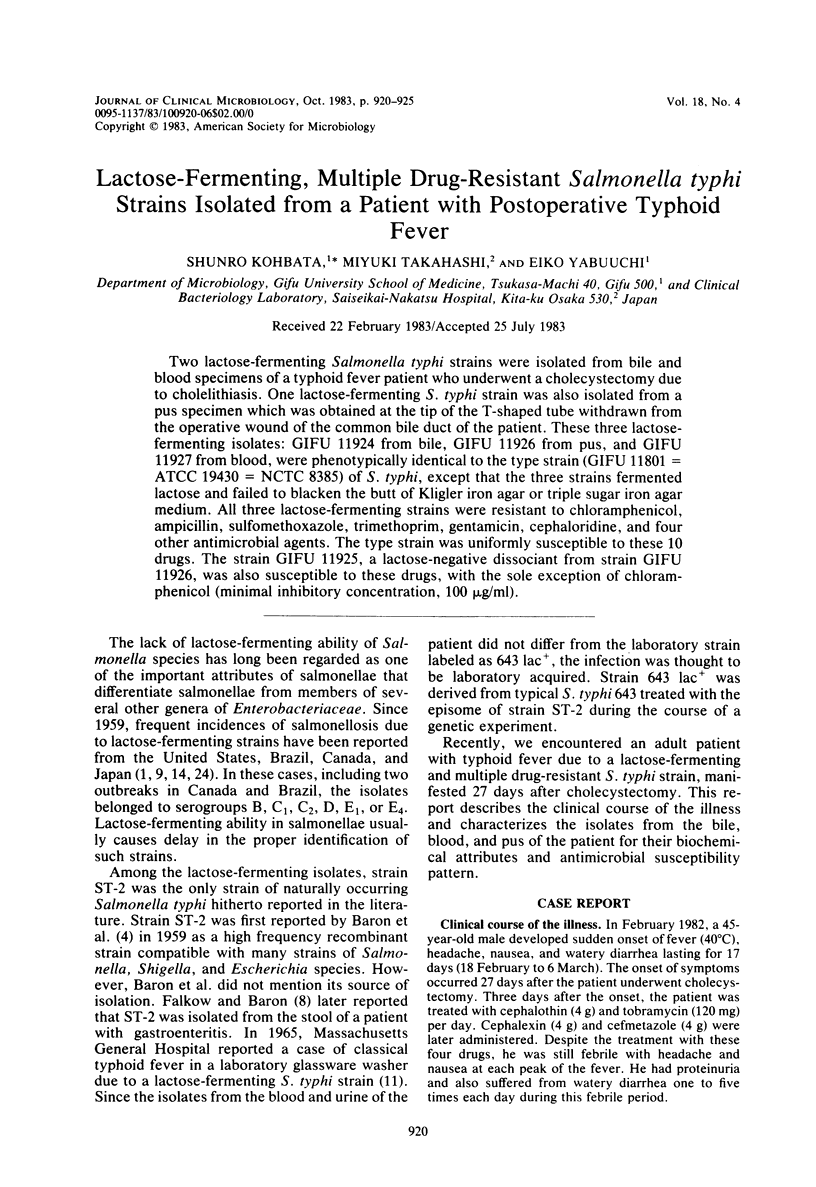
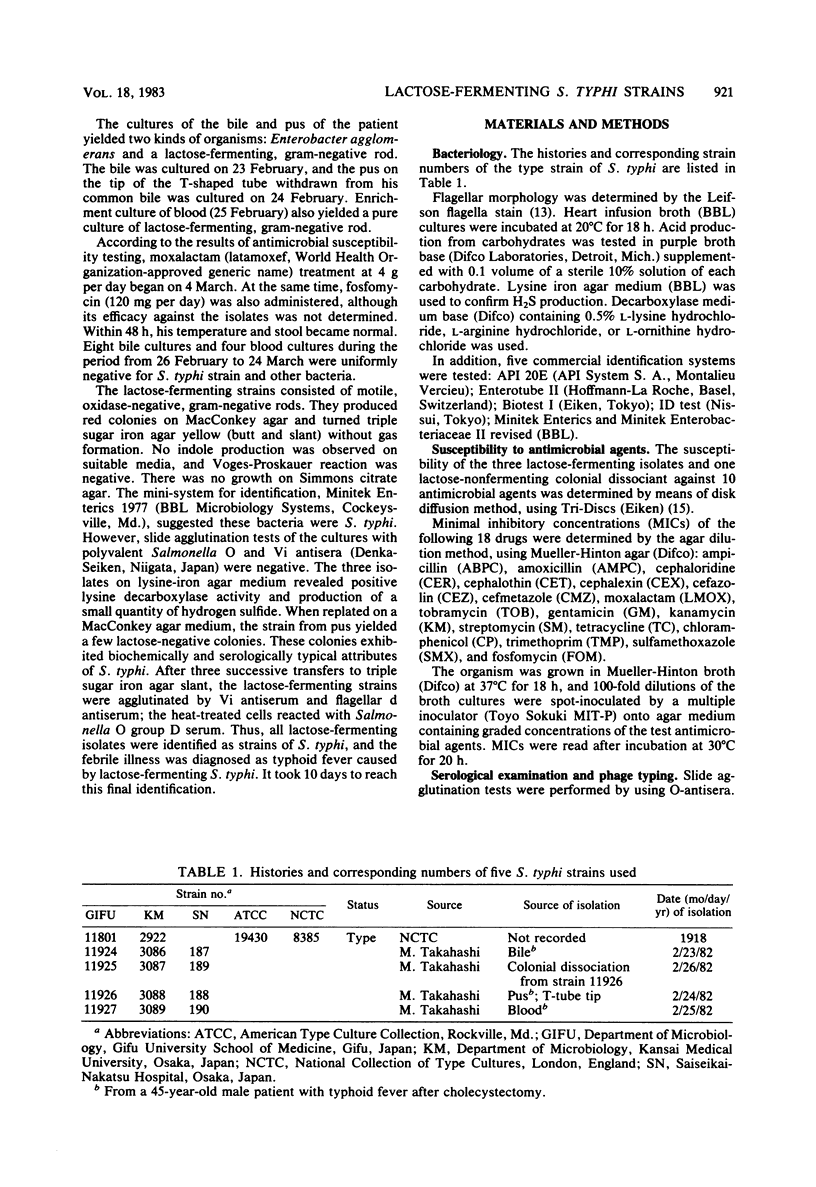
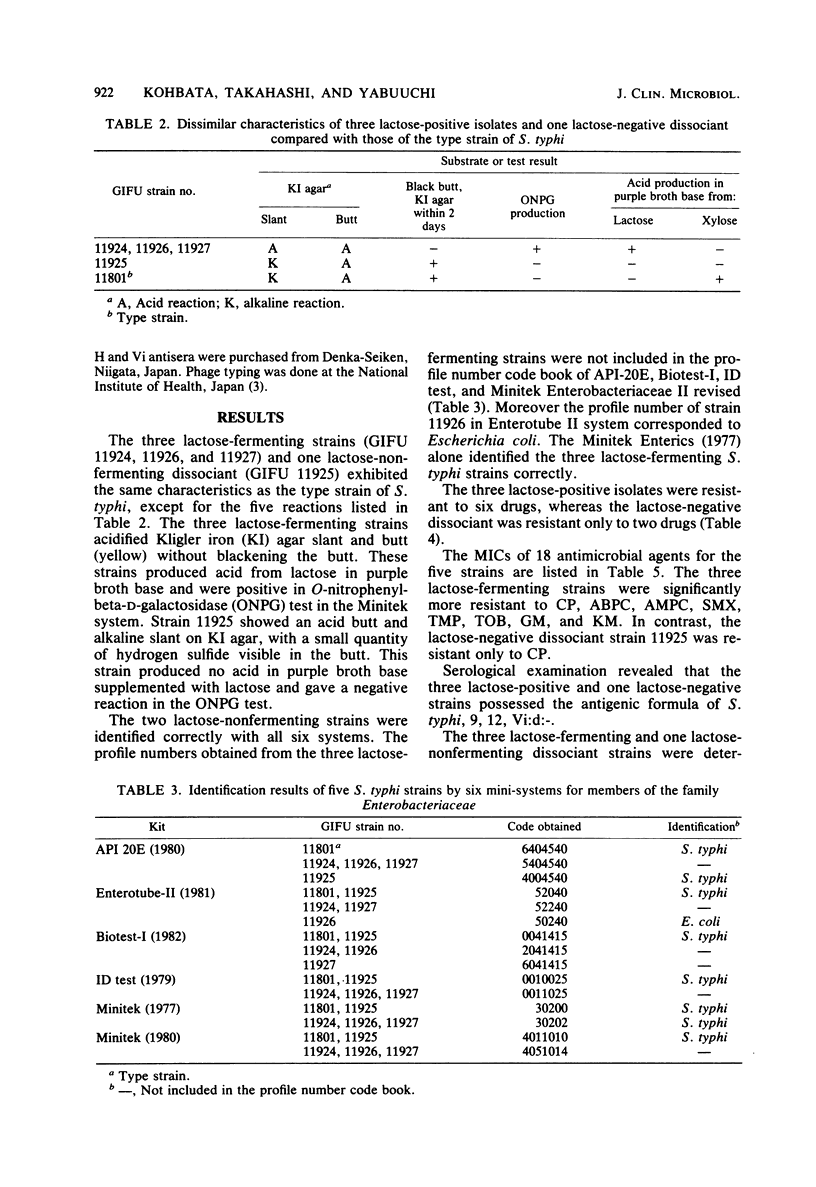
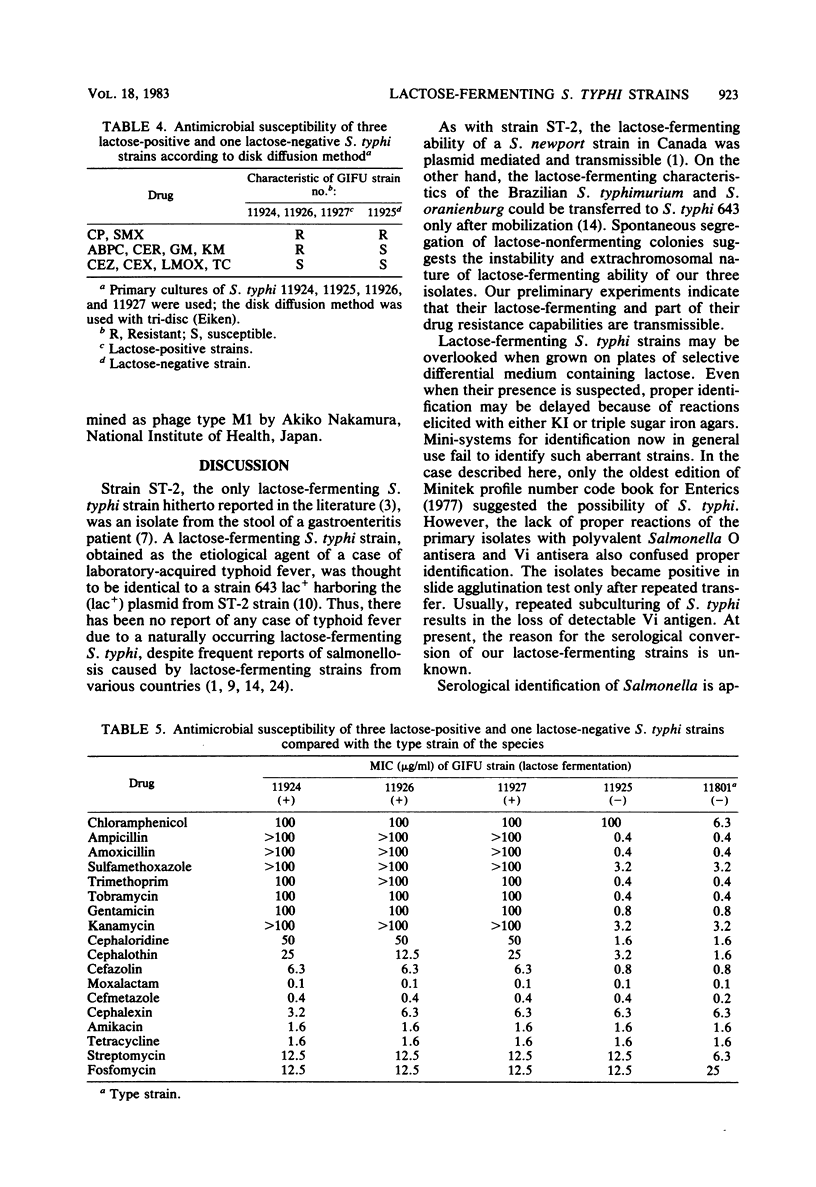
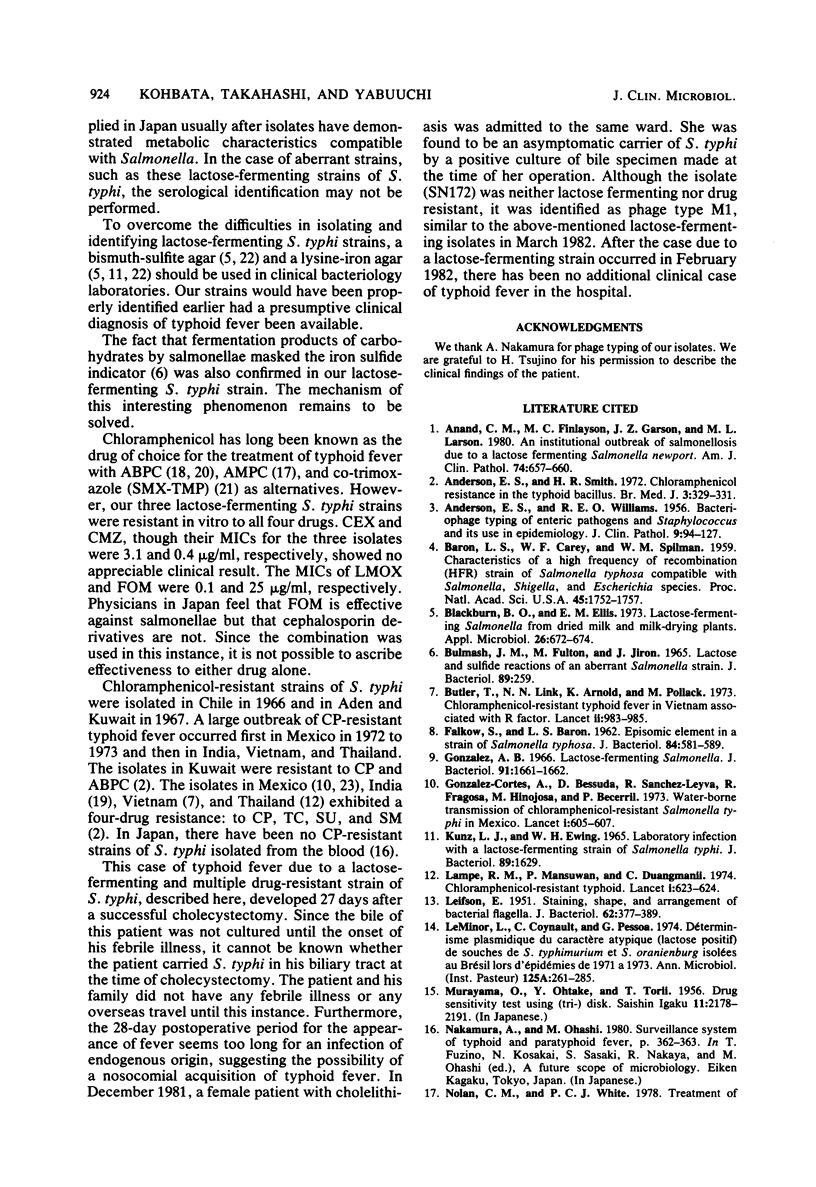
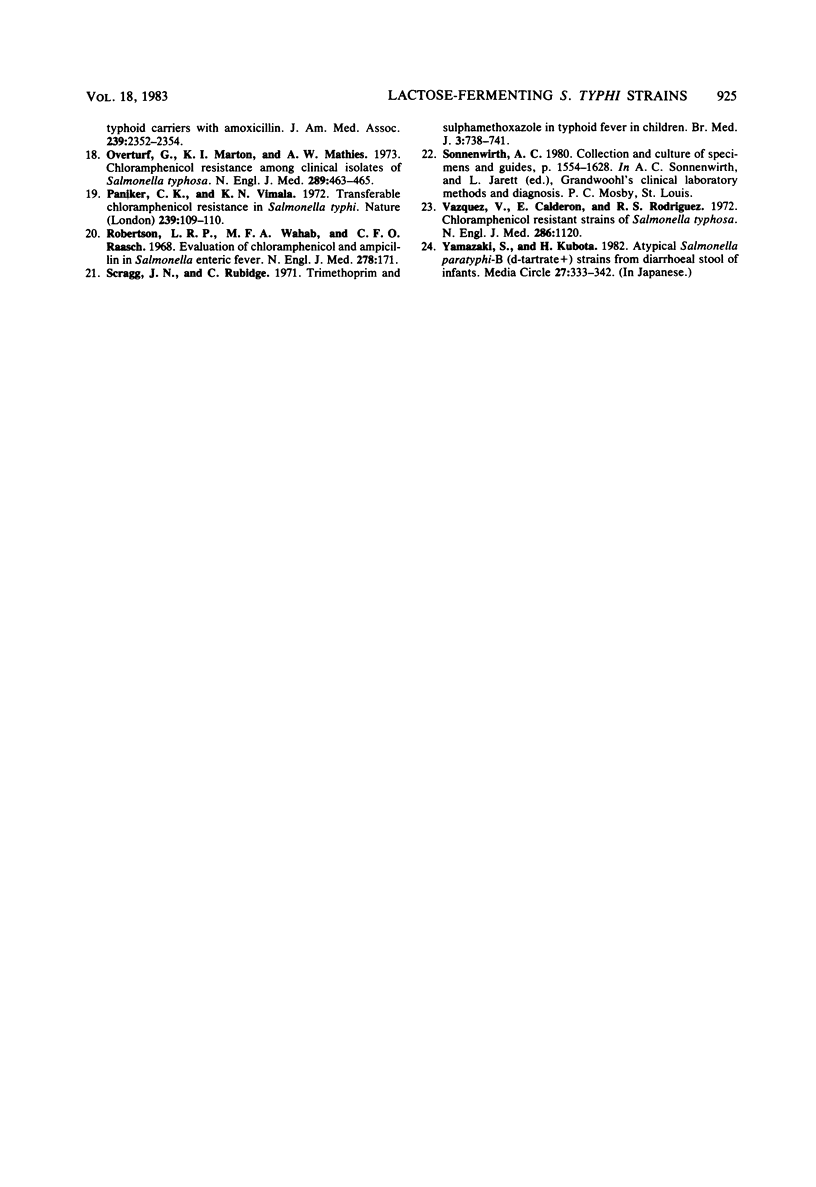
Selected References
These references are in PubMed. This may not be the complete list of references from this article.
- ANDERSON E. S., WILLIAMS R. E. Bacteriophage typing of enteric pathogens and staphylococci and its use in epidemiology. J Clin Pathol. 1956 May;9(2):94–127. doi: 10.1136/jcp.9.2.94. [DOI] [PMC free article] [PubMed] [Google Scholar]
- Anand C. M., Finlayson M. C., Garson J. Z., Larson M. L. An institutional outbreak of Salmonellosis due to lactose-fermenting Salmonella newport. Am J Clin Pathol. 1980 Nov;74(5):657–660. doi: 10.1093/ajcp/74.5.657. [DOI] [PubMed] [Google Scholar]
- Anderson E. S., Smith H. R. Chloramphenicol resistance in the typhoid bacillus. Br Med J. 1972 Aug 5;3(5822):329–331. doi: 10.1136/bmj.3.5822.329. [DOI] [PMC free article] [PubMed] [Google Scholar]
- Baron L. S., Carey W. F., Spilman W. M. CHARACTERISTICS OF A HIGH FREQUENCY OF RECOMBINATION (HFR) STRAIN OF SALMONELLA TYPHOSA COMPATIBLE WITH SALMONELLA, SHIGELLA, AND ESCHERICHIA SPECIES. Proc Natl Acad Sci U S A. 1959 Dec;45(12):1752–1757. doi: 10.1073/pnas.45.12.1752. [DOI] [PMC free article] [PubMed] [Google Scholar]
- Blackburn B. O., Ellis E. M. Lactose-fermenting Salmonella from dried milk and milk-drying plants. Appl Microbiol. 1973 Nov;26(5):672–674. doi: 10.1128/am.26.5.672-674.1973. [DOI] [PMC free article] [PubMed] [Google Scholar]
- Butler T., Linh N. N., Arnold K., Pollack M. Chloramphenicol-resistant typhoid fever in Vietnam associated with R factor. Lancet. 1973 Nov 3;302(7836):983–985. doi: 10.1016/s0140-6736(73)91086-6. [DOI] [PubMed] [Google Scholar]
- Gonzalez-Cortes A., Bessudo D., Sanchez-Leyva R., Fragoso R., Hinojosa M., Becerril P. Water-borne transmission of chloramphenicol-resistant Salmonella typhi in Mexico. Lancet. 1973 Sep 15;2(7829):605–607. doi: 10.1016/s0140-6736(73)92427-6. [DOI] [PubMed] [Google Scholar]
- Gonzalez A. B. Lactose-fermenting Salmonella. J Bacteriol. 1966 Apr;91(4):1661–1662. doi: 10.1128/jb.91.4.1661-1662.1966. [DOI] [PMC free article] [PubMed] [Google Scholar]
- KUNZ L. J., EWING W. H. LABORATORY INFECTION WITH A LACTOSE-FERMENTING STRAIN OF SALMONELLA TYPHI. J Bacteriol. 1965 Jun;89:1629–1629. doi: 10.1128/jb.89.6.1629-1629.1965. [DOI] [PMC free article] [PubMed] [Google Scholar]
- LEIFSON E. Staining, shape and arrangement of bacterial flagella. J Bacteriol. 1951 Oct;62(4):377–389. doi: 10.1128/jb.62.4.377-389.1951. [DOI] [PMC free article] [PubMed] [Google Scholar]
- Lampe R. M., Mansuwan P., Duangmani C. Letter: Chloramphenicol--resistant typhoid. Lancet. 1974 Apr 6;1(7858):623–624. doi: 10.1016/s0140-6736(74)92678-6. [DOI] [PubMed] [Google Scholar]
- Le Minor L., Coynault C., Pessoa G. Déterminisme plasmidique du caractère atypique "lactose positif" de souches de S. typhi-murium et de S. oranienburg isolées au Brésil lors d'épidémies de 1971 à 1973. Ann Microbiol (Paris) 1974 Apr;125A(3):261–285. [PubMed] [Google Scholar]
- Nolan C. M., White P. C., Jr Treatment of typhoid carriers with amoxicillin. Correlates of successful therapy. JAMA. 1978 Jun 2;239(22):2352–2354. doi: 10.1001/jama.239.22.2352. [DOI] [PubMed] [Google Scholar]
- Overturf G., Marton K. I., Mathies A. W., Jr Antibiotic resistance in typhoid fever. Chloramphenicol resistance among clinical isolates of Salmonella typhosa in Los Angeles, 1972--epidemiologic and bacteriologic characteristics. N Engl J Med. 1973 Aug 30;289(9):463–465. doi: 10.1056/NEJM197308302890906. [DOI] [PubMed] [Google Scholar]
- Paniker C. K., Vimala K. N. Transferable chloramphenicol resistance in Salmonella typhi. Nature. 1972 Sep 8;239(5367):109–110. doi: 10.1038/239109b0. [DOI] [PubMed] [Google Scholar]
- Robertson R. P., Wahab M. F., Raasch F. O. Evaluation of chloramphenicol and ampicillin in salmonella enteric fever. N Engl J Med. 1968 Jan 25;278(4):171–176. doi: 10.1056/NEJM196801252780401. [DOI] [PubMed] [Google Scholar]
- Scragg J. N., Rubidge C. J. Trimethoprim and sulphamethoxazole in typhoid fever in children. Br Med J. 1971 Sep 25;3(5777):738–741. doi: 10.1136/bmj.3.5777.738. [DOI] [PMC free article] [PubMed] [Google Scholar]



